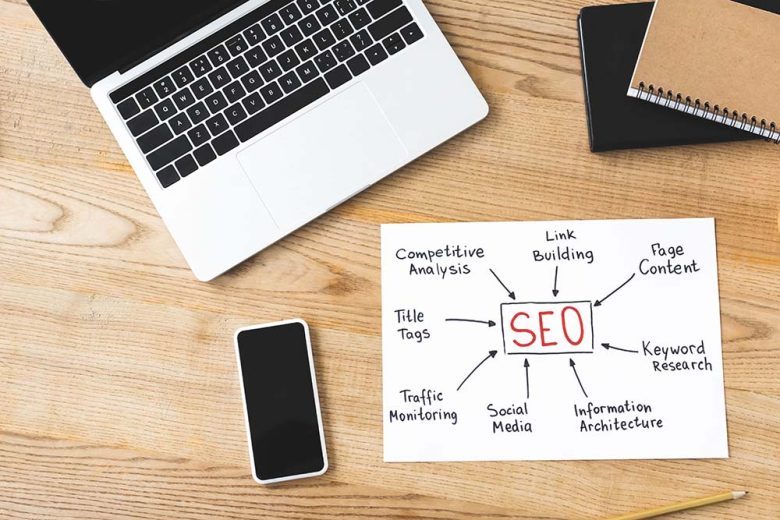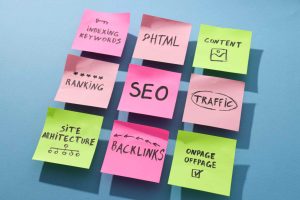Whether you’re a small business owner or managing a larger enterprise, you need SEO to enhance your online visibility, attract more organic traffic, and connect with potential customers actively searching for your products or services.
SEO is all about improving your website so that it shows up in search results when potential customers are looking for what you offer.
However, to truly master SEO, it’s essential to grasp the difference between on-page and off-page SEO. This blog will be your guide to on-page and off-page SEO, which will help you improve your online visibility and attract more visitors.
What is on-page SEO?
On-page SEO refers to the practices applied directly within your website to improve its search engine rankings. This includes various elements that influence how search engines and users perceive your site. Here’s why on-page SEO is important for website optimisation:
1. Relevance: Ensures your content matches the search intent of your target audience, helping you rank for relevant keywords.
2. User experience: Enhances the overall experience for visitors, which can reduce bounce rates and improve engagement.
3. Crawlability: Optimises your website’s structure so search engines can easily crawl and index your pages.
4. Control: Gives you direct influence over many factors that affect your site’s ranking, enabling you to make adjustments as needed.
Important on-page SEO strategies
Content quality
The foundation of effective on-page SEO lies in the quality of your content. High-quality, relevant content is essential for attracting and retaining visitors.
1. Importance of high-quality content: Content should be informative, engaging, and provide value to your audience. It’s essential for building trust and encouraging repeat visits.
2. Using keywords effectively: Conduct thorough keyword research to identify relevant keywords and integrate them naturally into your content. Aim for a balance, using primary keywords in titles and headers, while incorporating secondary keywords throughout the text to avoid keyword stuffing.
HTML tags
HTML tags are integral to on-page SEO, signalling to search engines what your content is about.
1. Significance of title tags: Title tags are critical as they appear in search results and affect click-through rates. Each page should have a unique title tag that accurately describes the page content and includes relevant keywords.
2. Meta descriptions: Craft compelling meta descriptions that summarise your page content and include keywords. Though meta descriptions don’t directly impact rankings, they can influence user behaviour.
3. Header tags: Use header tags (H1, H2, H3) to structure your content hierarchically. This not only helps search engines understand your content but also makes it easier for users to read.
URL structure
Keep URLs short, descriptive, and keyword-rich. Avoid complex parameters and unnecessary characters. A clear URL structure helps both users and search engines understand the page content.
Internal linking
Internal linking enhances site navigation, distributes page authority, and encourages users to explore more content. It also helps search engines crawl your site more efficiently, potentially improving the rankings of linked pages.
User experience
User experience (UX) is a critical factor in on-page SEO.
1. Page load speed: Fast-loading pages improve user satisfaction and reduce bounce rates. Aim for a load time of under three seconds.
2. Mobile responsiveness: With the growing number of mobile users, a mobile-friendly site is essential. Use responsive design to ensure your site looks great on all devices.
3. Site navigation: An intuitive navigation structure helps users find information quickly, leading to a better overall experience.
What is off-page SEO?
Off-page SEO refers to optimisation efforts that occur outside your website. This primarily focuses on building authority and trustworthiness through various means. Here’s why off-page SEO is crucial:
1. Link building: Establishes credibility and authority through backlinks from reputable sites, signalling to search engines that your content is valuable.
2. Brand awareness: Enhances visibility across various platforms, helping to attract more potential customers.
3. Trust signals: Builds trust with both search engines and users, which is essential for long-term SEO success.
Effective off-page SEO techniques
Link building
Link building is a fundamental aspect of off-page SEO.
1. Importance of backlinks: Backlinks from authoritative sites act as endorsements for your content, enhancing your site’s credibility and improving its ranking.
2. Strategies for acquiring links: Consider outreach strategies like guest blogging, collaborations with industry leaders, and creating high-quality, shareable content that naturally attracts links.
Social media marketing
Increased engagement and shares on social platforms can lead to more backlinks and traffic, ultimately boosting your search engine visibility. Active social media presence can also foster community engagement and brand loyalty.
Guest blogging
Writing guest posts exposes your brand to a new audience, provides opportunities for backlinks, and positions you as an authority in your field. Ensure that your guest posts are published on reputable sites within your industry to maximise benefits.
Influencer outreach
Partnering with influencers allows you to leverage their audience and increase brand awareness. Influencer endorsements can lead to increased traffic and more backlinks, positively impacting your SEO.
Why do you need professional SEO services in the UK?
Collaborating with the best digital marketing agency in the UK can provide numerous benefits for both on-page and off-page SEO:
1. Expertise: Professionals have a deep understanding of the latest SEO trends, best practices, and algorithm changes, ensuring your strategies are effective.
2. Time-saving: Outsourcing your SEO allows you to focus on your core business activities while experts handle the complexities of SEO.
3. Custom strategies: SEO professionals can create tailored strategies that cater to your specific business needs and target audience.
4. Performance tracking: Experts can effectively track and analyse your SEO performance, making necessary adjustments to improve results.
Get in touch with Haarty Hanks for local SEO services
It’s important to balance on-page and off-page SEO for a strong digital marketing strategy.
For any business wanting to strengthen its online presence, effective SEO is a smart investment that leads to lasting success and helps you reach your goals.
If you’re seeking digital marketing services for your pharmacy, don’t hesitate to reach out to us. We’re here to help you build a strong online presence!




